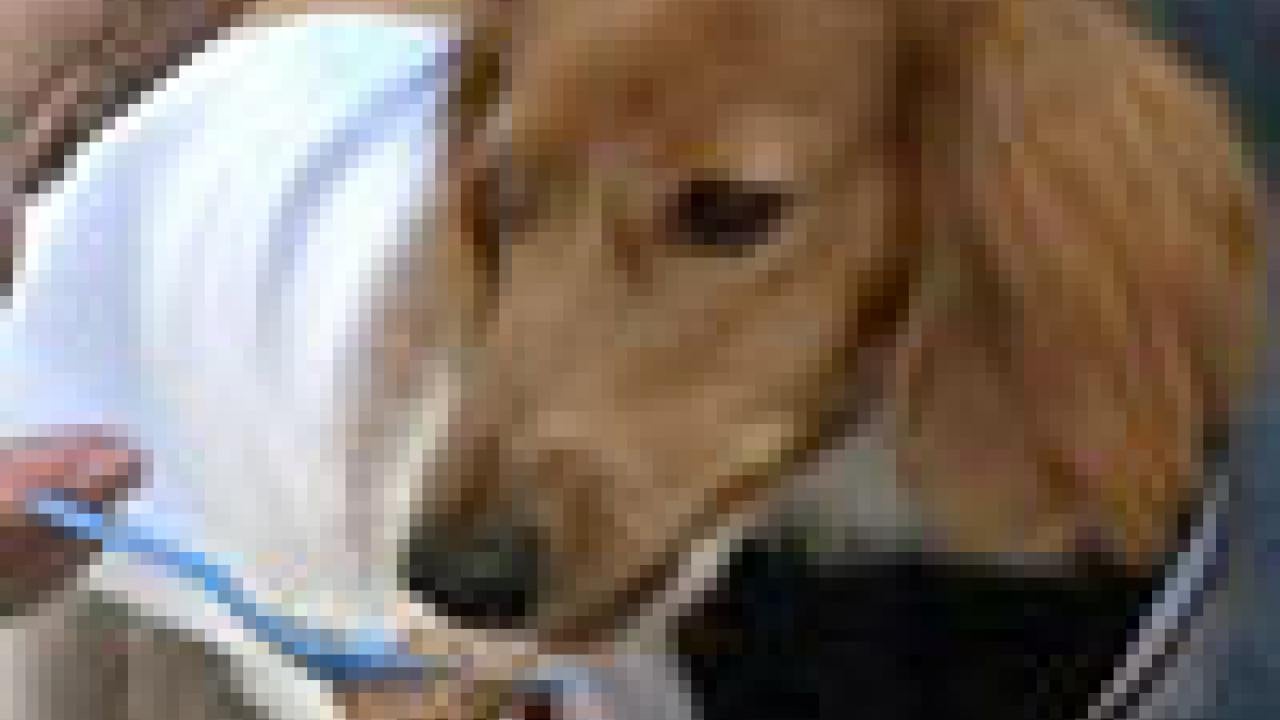A 1-year old dog named Mojito appears to have a healthy life ahead of it, thanks to doctors from the UC Davis schools of medicine and veterinary medicine who collaborated on a unique surgical procedure to treat the canine's near-fatal swallowing disorder.
Without treatment, the one-year-old male miniature dachshund would have continued to choke on food and struggle with drinking water. The disorder typically leads to aspiration pneumonia, a perilous inflammation of lungs and airways.
Peter Belafsky, an associate professor of otolaryngology at UC Davis School of Medicine, and Stanley Marks, a professor of medicine and epidemiology at UC Davis School of Veterinary Medicine, performed the unusual operation last month at the university's veterinary medical teaching hospital in Davis. The young canine, which is owned by a Roseville, Calif., family, returned this week for a follow-up visit with its two doctors, who wanted to assess the recovery of their patient.
"This is truly a group effort," said Belafsky, who directs the Center for Voice and Swallowing at UC Davis Medical Center in Sacramento. "We are combining the best of our human and veterinary research and surgery teams to advance science and medicine. Together, we pioneered the use of botulinum toxin injections to treat esophageal problems in animals, and Mojito's surgery represents another important step in that work."
Belafsky, who normally treats human patients, operated on a throat muscle in the dog that affects its ability to swallow. The surgery has been successfully used for about 10 years in human patients suffering from a condition known as cricopharyngeal dysfunction, a disorder involving a small ring of muscle on top of the esophagus (the cricopharyngeal muscle) that fails to relax adequately or work in a coordinated manner, causing extreme swallowing difficulties and aspiration.
Cricopharyngeal muscle disorders and swallowing problems are common to both canines and humans. Belafsky and Marks were intrigued by the case because surgical treatment held the promise of saving the young canine's life while also providing unique learning opportunities that can benefit other animal and human patients.
"We have used injections into the cricopharyngeal muscle with Mojito that have helped tremendously and enabled him to eat food and drink water," said Marks, an expert in swallowing disorders in animals and director of the university's Companion Animal Gastrointestinal Laboratory. "However, that treatment only alleviates the problem for a month or two. This disorder requires a permanent fix, and we're optimistic the procedure we used with Mojito could be the answer."
Marks initiated the surgery by placing a temporary feeding tube into Mojito's stomach. Belafsky then used the same kind of laser-assisted device used for human patients to cut and divide the dog's cricopharyngeal muscle so that it no longer will constrict and prevent the passage of food into the dog's esophagus. The minimally invasive procedure — known as a laser-assisted cricopharyngeal myotomy — did not require any external incisions and took less than an hour.
Belafsky and Marks said that Mojito's prognosis is excellent. His owners report that he is now able to eat a mushy food mixture without choking.
"The physical characteristics of a canine's cricopharyngeal muscle are remarkably similar to what I see in human patients, which made the procedure go very smoothly," added Belafsky. "What also made the surgery go so well was the support we received from the surgical team at the medical center in Sacramento. Their assistance enabled us to share some new operating room technology and techniques with our veterinary colleagues in Davis."
The close collaboration between the two UC Davis schools has enabled Belafsky and Marks to pursue a variety of important studies, including research into esophageal reflux disease, the use of injection treatments for esophageal disorders, endoscopic evaluation of swallowing and novel imaging techniques for evaluations of the swallowing process.
The pair is now in the process of developing an innovative mechanical device to help address swallowing problems for people and animals. They also plan to provide surgical training for veterinary surgeons now that the procedure for little Mojito appears to be a success.
"This is the best of both worlds," said Marks. "By learning from each other, we're discovering answers that can benefit both animals and people. From an academic research and clinical care perspective, it is the ideal way to advance medicine."
About UC Davis
For more than 100 years, UC Davis has engaged in teaching, research and public service that matter to California and transform the world. Located close to the state capital, UC Davis has 32,000 students, an annual research budget that exceeds $600 million, a comprehensive health system and 13 specialized research centers. The university offers interdisciplinary graduate study and more than 100 undergraduate majors in four colleges — Agricultural and Environmental Sciences, Biological Sciences, Engineering, and Letters and Science. It also houses six professional schools — Education, Law, Management, Medicine, Veterinary Medicine and the Betty Irene Moore School of Nursing.
Media Resources
Pat Bailey, Research news (emphasis: agricultural and nutritional sciences, and veterinary medicine), 530-219-9640, pjbailey@ucdavis.edu
